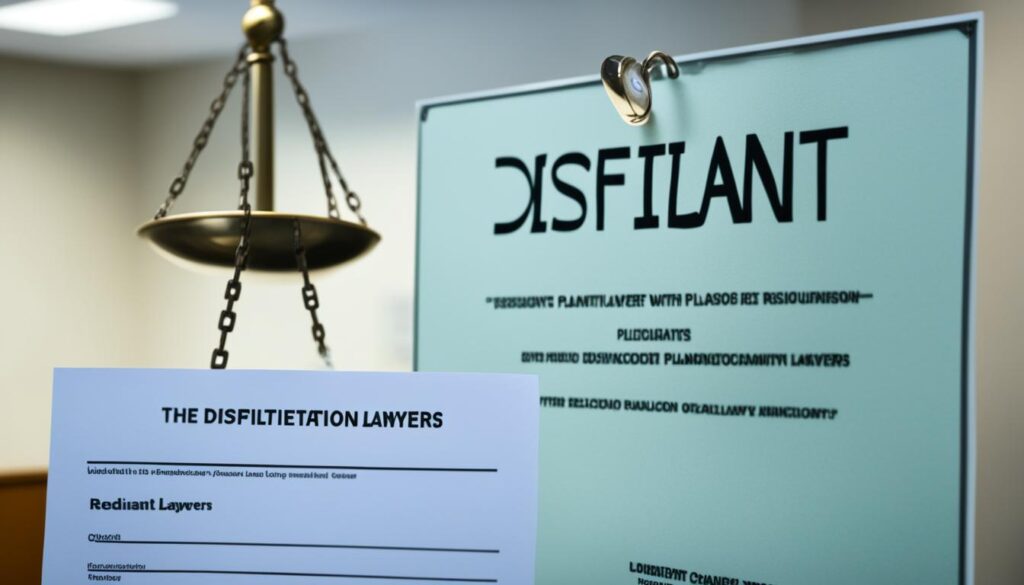When it comes to resolving contract disputes, the expertise of dispute resolution lawyers is invaluable. These professionals specialize in skilled mediation and negotiation services, aiming to help parties find common ground and reach mutually agreeable solutions. By leveraging their knowledge and experience in contract law, dispute resolution lawyers play a critical role in facilitating productive discussions and preventing further harm to businesses involved in contract disputes.
Key Takeaways:
- Dispute resolution lawyers are skilled in mediation and negotiation for contract disputes.
- They help parties find common ground and reach mutually agreeable solutions.
- These lawyers have expertise in contract law and prevent further harm to businesses.
- Skilled mediation is crucial in resolving contract disputes effectively.
- Dispute resolution lawyers play a vital role in finding solutions and preventing legal complications.
The Importance of Dispute Resolution Lawyers in Business
Dispute resolution lawyers play a critical role in the world of business. They are essential in handling a wide range of disputes that can arise from commercial transactions, ensuring that businesses can protect their interests and assets. Whether it’s resolving business disputes through mediation or representing clients in business litigation, these lawyers are skilled in navigating the complexities of business law to achieve favorable outcomes for their clients.
One of the key reasons why dispute resolution lawyers are crucial in business is their ability to handle various types of disputes that can arise. From internal conflicts within a company to disputes with external parties, these lawyers have the expertise to analyze complex issues and provide effective legal advice. By leveraging their knowledge of business law, they can help businesses protect their interests and prevent potential legal threats.
When it comes to commercial transactions, business dispute lawyers are adept at identifying potential risks and ensuring that their clients’ interests are safeguarded. They provide valuable guidance throughout the negotiation and contract drafting stages, ensuring that businesses enter into agreements that protect their assets and minimize the risk of future disputes. By having a legal expert on their side, businesses can navigate the intricacies of business law with confidence.
In the unfortunate event of a business dispute, dispute resolution lawyers are equipped to provide representation and advocate for their clients’ interests. They have experience in both negotiation and litigation, allowing them to adapt their approach based on the nature of the dispute. Whether it’s negotiating a settlement or litigating a case in court, these lawyers work tirelessly to protect their clients’ rights and achieve the best possible outcome.
Additionally, dispute resolution lawyers bring a wealth of knowledge about alternative dispute resolution methods. They can advise businesses on the most effective approaches, such as mediation or arbitration, to resolve disputes efficiently and cost-effectively. These alternative methods often help businesses maintain relationships with other parties involved and minimize the disruption to their operations.
In conclusion, the importance of dispute resolution lawyers in business cannot be overstated. From commercial transactions to business disputes, these lawyers play a critical role in protecting the interests and assets of their clients. By leveraging their expertise in business law, dispute resolution lawyers help businesses navigate complex legal issues, find mutually agreeable solutions, and maintain the stability and reputation of their operations.
Common Types of Business Disputes
Business disputes can arise in various forms, ranging from contractual disagreements to conflicts over intellectual property and employment law issues. Dispute resolution lawyers are well-versed in handling these common types of disputes and possess the expertise to navigate the legal complexities involved. By seeking guidance and representation from these professionals, businesses can effectively protect their rights and resolve disputes in a favorable manner.
Breach of Contract
One of the most prevalent types of business disputes is a breach of contract. When one party fails to fulfill its obligations as stated in a legally binding agreement, it can lead to conflicts and financial harm. Dispute resolution lawyers assist in interpreting the terms of the contract, identifying breaches, and seeking appropriate remedies to mitigate the damages suffered.
Partnership Disputes
Partnership disputes can arise when co-owners or partners disagree on various aspects of the business, such as decision-making, profit distribution, or the division of responsibilities. Dispute resolution lawyers help in negotiating solutions or, if necessary, initiating legal procedures to dissolve partnerships, safeguarding the interests of all involved parties.
Intellectual Property Disputes
Intellectual property (IP) disputes revolve around the protection of patents, copyrights, and trademarks. These disputes can involve claims of infringement, misappropriation, or unauthorized use of protected assets. Dispute resolution lawyers provide counsel and representation to enforce IP rights and defend against unfounded claims.
Employment Law Issues
Businesses often encounter disputes related to employment law, including issues like wrongful termination, discrimination, harassment, or violations of labor laws. Dispute resolution lawyers assist businesses in complying with employment regulations, resolving conflicts with employees, and defending against claims to protect the company’s reputation and ensure compliance with the law.
Trade Secrets
Trade secret disputes arise when valuable business information, formulas, or strategies are shared or used without authorization. Dispute resolution lawyers assist in protecting trade secrets, initiating legal actions against unauthorized parties, and seeking remedies to prevent further harm to the business’s competitive advantage.
| Type of Business Dispute | Description |
|---|---|
| Breach of Contract | A disagreement between parties regarding the terms and obligations of a contract. |
| Partnership Disputes | Conflicts that arise among co-owners or partners concerning various aspects of the business. |
| Intellectual Property Disputes | Disagreements over the protection, usage, or misappropriation of intellectual property assets. |
| Employment Law Issues | Conflicts related to employment law, including wrongful termination, discrimination, and labor law violations. |
| Trade Secrets | Disputes involving the unauthorized use or disclosure of valuable business information or strategies. |
Preventing Business Disputes in California
To minimize the risk of business disputes in California, it is crucial for businesses to take proactive measures. By following these preventive steps, businesses can protect their interests, maintain positive relationships with clients and partners, and avoid costly legal battles.
Effective Contracts
One of the most important ways to prevent disputes is by having effective contracts in place. Effective contracts clearly define the rights, responsibilities, and expectations of all parties involved. They should be meticulously drafted, reviewed by legal professionals, and tailored to the specific needs of the business. By ensuring that contracts accurately reflect the intentions and agreements of all parties, businesses can minimize the potential for misunderstandings and conflicts.
Seeking Advice
Seeking legal advice from a business dispute lawyer is essential in preventing disputes. These lawyers have the expertise and experience to identify potential areas of contention and provide guidance on how to navigate complex legal issues. Whether it’s consulting with a lawyer before entering into significant business agreements or seeking guidance when disputes arise, their knowledge can help businesses make informed decisions and minimize the risk of conflicts.
Document Everything
Thorough documentation is crucial in preventing disputes. Businesses should maintain detailed records of all important events, communications, transactions, and agreements. Documenting everything provides a solid foundation of evidence in case of future disagreements. Emails, contracts, invoices, and meeting minutes should all be properly stored and organized. By having a well-documented record, businesses can support their positions and prevent disputes from escalating.
Minimize Risk
Minimizing risk is another effective strategy in preventing disputes. Businesses should conduct a comprehensive risk assessment to identify potential areas of vulnerability. Taking proactive steps to address these risks can help prevent disputes from arising. This may involve implementing internal controls, establishing clear policies and procedures, and regularly reviewing and updating business practices to align with legal requirements and industry standards.
Implementing these preventive measures can significantly reduce the likelihood of business disputes in California. However, should a dispute still arise, having a skilled business dispute lawyer on your side is crucial. These lawyers can provide valuable guidance and represent businesses in negotiations, mediation, arbitration, and litigation if necessary.
In conclusion, by focusing on effective contracts, seeking advice, documenting everything, and minimizing risk, businesses can proactively prevent disputes and safeguard their interests in the competitive business landscape of California.
Resolving Business Disputes in California
When facing a business dispute in California, it’s essential to explore various methods of alternative dispute resolution before resorting to litigation. These alternatives, including negotiation, mediation, and arbitration, can provide a more efficient and cost-effective way to resolve conflicts, fostering better outcomes for all parties involved.
Negotiation: Finding Common Ground
Negotiation is the first step in resolving a business dispute. It involves open discussions between parties to reach a mutually agreeable solution. Business professionals or attorneys experienced in negotiation techniques can facilitate productive conversations and guide the process.
Mediation: Facilitating Agreement
Mediation is a voluntary process where a neutral third party, often a trained mediator, assists the parties in finding a resolution. In mediation, the mediator helps the parties communicate, identify common interests, and explore creative solutions. Mediation offers a confidential and non-adversarial space for parties to work together collaboratively.
“Mediation allows disputing parties to maintain control over the outcome and can often preserve relationships, making it an attractive option for resolving business disputes.” – John Smith, Business Dispute Attorney
Arbitration: A Binding Decision
Arbitration involves presenting the dispute to a neutral third party, an arbitrator, who reviews the evidence and makes a binding decision. This process is more formal than mediation but less formal than litigation. The arbitrator’s decision is typically final and legally enforceable, providing a final resolution to the dispute.
Litigation: Resolving Disputes in Court
If alternative dispute resolution methods fail to reach a satisfactory outcome, litigation becomes the last resort. Litigation involves taking the dispute to court, where a judge or jury decides the case based on applicable laws and evidence presented. Business dispute attorneys play a crucial role in representing their clients’ interests throughout the litigation process.
In choosing the appropriate resolution method, consulting with a knowledgeable business dispute attorney is paramount. Business dispute attorneys have the expertise to evaluate the unique circumstances of each case and guide their clients towards the most effective dispute resolution strategy.

| Resolution Method | Process | Advantages |
|---|---|---|
| Negotiation | Open discussions between parties |
|
| Mediation | Assisted discussions with a neutral third party |
|
| Arbitration | Submission of the dispute to a neutral third party |
|
| Litigation | Resolution through court proceedings |
|
Choosing the appropriate dispute resolution method is crucial to efficiently and effectively resolve business disputes in California. Whether through negotiation, mediation, arbitration, or litigation, the guidance of a skilled business dispute attorney is invaluable in navigating the complexities of the resolution process and securing the best possible outcome for all parties involved.
Mediation as an Alternative Dispute Resolution
Mediation is a form of alternative dispute resolution that offers parties in conflict an opportunity to resolve their disputes with the assistance of a neutral third party, known as a mediator. Mediators are skilled in conflict resolution and possess the expertise to create a conducive environment for open communication and productive negotiations. Their objective is to guide the parties towards reaching a mutually acceptable agreement.
Unlike litigation or arbitration, mediation is a voluntary process in which the mediator facilitates discussions between the parties, helping them identify common interests and explore potential solutions. The mediator does not make rulings or enforce decisions on the parties but rather promotes a cooperative atmosphere for dialogue and problem-solving.
Once an agreement is reached through mediation, it is essential to ensure its enforceability. Depending on the jurisdiction and the nature of the dispute, there are various ways to enforce a mediation agreement. In some cases, the parties may choose to have the agreement entered as a court order, which would make it enforceable through the court system. In other instances, the written mediation agreement itself serves as a legally binding contract, subject to the principles of contract law.
Enforcement mechanisms may differ depending on the jurisdiction and the specific circumstances of the case. It is crucial for parties participating in mediation to understand the applicable laws and regulations governing the enforceability of mediation agreements in their jurisdiction.

Benefits of Mediation
Mediation offers several advantages over traditional dispute resolution methods:
- Confidentiality: Mediation proceedings are confidential, allowing parties to freely discuss and explore potential resolutions without fear of their statements being used against them in future litigation.
- Cost-effective: Mediation is often more cost-effective than litigation, as it reduces legal fees, court costs, and other expenses associated with formal legal proceedings.
- Control and Flexibility: Parties have more control over the outcome of their dispute in mediation, as they actively participate in the decision-making process and have the flexibility to craft creative and personalized solutions.
- Preservation of Relationships: Mediation aims to preserve relationships between parties, as it encourages open communication, empathy, and understanding.
- Timeliness: Mediation can often lead to quicker resolution of disputes compared to lengthy court proceedings, allowing parties to move forward and focus on their respective interests.
Example Mediation Agreement
We, the undersigned parties, hereby state our intention to resolve our dispute through mediation. We acknowledge that (mediator’s name) will mediate the discussions between us in an unbiased and neutral manner.
We understand that mediation is a voluntary process, and we commit to participating in good faith, engaging in open and honest communication, and working towards a mutually acceptable resolution.
Should we reach an agreement through mediation, we agree to abide by the terms and conditions set forth in the agreement. Recognizing that the mediation agreement may be legally binding, we undertake to fulfill our obligations and actively cooperate in its enforcement.
Each party has carefully reviewed this mediation agreement, and by signing below, we acknowledge our understanding and consent to its terms.
Enforceability of Mediation Agreements
Enforceability of mediation agreements can depend on various factors, such as the jurisdiction, the nature of the dispute, and the agreement’s compliance with the applicable laws. In some jurisdictions, a mediation agreement may be enforceable as a contract, while in others, the agreement may need to be converted into a court order for enforceability.
It is crucial for parties engaging in mediation to seek legal advice on the enforceability of the mediation agreement in their jurisdiction. This ensures that the parties have a clear understanding of their rights and obligations under the agreement and can take appropriate action to enforce it if necessary.
| Enforcement Method | Explanation |
|---|---|
| Court Order | If the mediation agreement is converted into a court order, it becomes enforceable through the court system, allowing parties to seek legal remedies for non-compliance. |
| Legally Binding Contract | In some jurisdictions, the written mediation agreement itself may be considered a legally binding contract, subject to the principles of contract law. |
It is essential to consult with a qualified attorney to understand the specific requirements and procedures for enforcing mediation agreements in a particular jurisdiction.
The Process of Mediation
Mediation is an informal procedure often used to resolve disputes, offering a collaborative and non-adversarial approach. Unlike arbitration or litigation, where a judge or arbitrator makes a binding decision, mediation relies on the parties’ voluntary agreement.
During mediation, the parties engage in discussions facilitated by a neutral third party known as a mediator. The mediator’s role is to guide the conversation, help identify common interests, and explore potential solutions to the dispute. By fostering open communication and promoting understanding, the mediator assists the parties in reaching a mutually acceptable agreement.
If an agreement is reached, it is advisable to reduce it to writing, even if it is not a formal legal document. A written mediation agreement serves as a clear record of the parties’ intentions and can help prevent misunderstandings in the future.

However, it’s important to note that in California, discussions, statements, and documents related to mediation are generally confidential by law. This means that what is said or presented during mediation cannot be used as evidence in court proceedings or other legal actions.
“Mediation emphasizes confidentiality, allowing the parties to speak openly without fear of their words being used against them. This promotes a more open and collaborative atmosphere, increasing the chances of finding a mutually agreeable solution.” – John Smith, Mediation Expert
The confidentiality of mediation encourages parties to be more candid and explore creative solutions without the fear of their statements being used against them later. This fosters a safe and supportive environment for open dialogue and problem-solving.
Although mediation discussions themselves may be confidential, the written mediation agreement can still be prepared at the end of the process. Depending on the parties’ intentions, this written agreement may be admissible as evidence of their agreement, should any disputes arise in the future.
Benefits of Mediation:
- Informal and flexible process
- Enhanced communication and understanding
- Party autonomy and control over the outcome
- Preservation of ongoing relationships
- Cost-effective compared to litigation
Mediation Agreement Table:
| Key Elements | Description |
|---|---|
| Identification of the parties | The agreement should clearly state the names and contact information of all parties involved. |
| Statement of the dispute | A concise description of the issues being mediated. |
| Terms of the agreement | A detailed explanation of the agreed-upon terms, rights, and responsibilities of each party. |
| Confidentiality clause | A provision outlining the confidentiality obligations of the parties and the consequences of any breach. |
| Enforceability | Language specifying the legal enforceability of the agreement, if applicable. |
Overall, mediation provides a flexible and effective approach to dispute resolution. It encourages open communication, promotes understanding, and allows parties to craft their own solutions. While the confidentiality of mediation protects the process, a written mediation agreement can still serve as a valuable record of the parties’ agreement.
Enforcing Mediation Agreements in California
When a mediation occurs as part of an ongoing lawsuit, the court has the authority to enter a court order or judgment based on the terms of the agreement. This order must be in writing, signed by all parties involved, and considered admissible as evidence. Just like any other court order, it can be enforced to ensure compliance.
In situations where mediation is not connected to a lawsuit but instead serves as an attempt to avoid litigation, enforcing the agreement may require filing a lawsuit for breach of contract based on the principles of contract law. This legal action helps invoke the legal system to reinforce the agreed terms and resolve any disputes arising from non-compliance.
In both scenarios, having a legally binding mediation agreement is crucial as it provides a basis for enforcement in the event of non-compliance. It is important for all parties involved to understand the implications and potential consequences of not adhering to the terms set forth in the agreement.
“A court order or judgment based on a mediation agreement serves as a strong legal instrument to ensure compliance with the agreed terms.”
Enforcing a mediation agreement through legal means establishes the importance of honoring the terms and upholds the integrity of contract law. It allows parties to rely on the agreement and seek legal remedies in case of non-compliance.
Overall, enforcing mediation agreements in California involves utilizing court orders, judgments, and the principles and remedies provided by contract law. By doing so, the legal system ensures that parties respect the terms they have mutually agreed upon and offers avenues to resolve any potential disputes that may arise.

| Key Points | Summary |
|---|---|
| Ongoing Lawsuit | The court can enter an order or judgment based on the mediation agreement. |
| Court Order | The order must be in writing, signed by all parties, and considered admissible as evidence. |
| Lawsuit for Breach of Contract | When mediation is not part of a lawsuit, enforcing the agreement may require filing a breach of contract lawsuit. |
| Admissible as Evidence | The mediation agreement, court order, or judgment can be considered admissible as evidence. |
| Contract Law | Enforcement of the agreement invokes the principles and remedies provided by contract law. |
The Role of a Business Dispute Lawyer
A business dispute lawyer is a legal professional who serves as an advocate for their clients, representing their interests both in courtrooms and conference rooms. These lawyers offer expert legal advice, provide representation in negotiations and court proceedings, and offer confidential consultations to address their clients’ specific needs.
With extensive knowledge and experience in business law and dispute resolution, business dispute lawyers are invaluable assets to businesses facing legal conflicts. They possess the expertise to navigate complex legal landscapes, ensuring that their clients’ interests are protected and that they have the best possible chance of achieving a favorable resolution.
Choosing the Right Business Dispute Lawyer
When it comes to resolving business disputes, selecting the right lawyer is crucial. Experience, knowledge, and a solid track record are key factors to consider in your search for the ideal legal representation. An experienced business dispute lawyer brings a wealth of expertise in handling similar cases, ensuring they understand the complexities of your unique situation. Their knowledgeable approach allows them to navigate the intricacies of business law and dispute resolution effectively.
One of the essential aspects of a successful attorney-client relationship is effective communication. A skilled lawyer knows the importance of clear and open lines of communication to ensure that you are kept informed and involved throughout the entire process. By fostering trust and maintaining regular communication, you can work collaboratively to achieve the best outcomes for your business.

“Trust is the foundation of any successful partnership. When choosing a business dispute lawyer, seek someone who instills trust from the very beginning. This trust allows you to place your confidence in their expertise and ability to handle your legal matters.”
Furthermore, a business dispute lawyer with a proven track record of success demonstrates their ability to deliver favorable outcomes for their clients. You should seek a lawyer who has experience in achieving positive results in cases similar to yours. This track record serves as a testament to their capabilities and provides reassurance that your legal matters are in capable hands.
Also Read:- Inspiring Lawyer Quotes: Wisdom from the Legal World
In summary, by carefully considering the experience, knowledge, expertise, track record, and maintaining effective communication while building trust, you can confidently select the right business dispute lawyer for your needs. Their professional guidance and legal representation will ensure that your business can navigate legal conflicts with confidence and achieve favorable outcomes.
Conclusion
Dispute resolution lawyers are essential partners for businesses facing contract and business disputes. Through their expertise in mediation services and alternative dispute resolution, these lawyers guide their clients through the complexities of legal conflicts, enabling them to protect their interests and find mutually agreeable solutions. By seeking the advice of knowledgeable attorneys, businesses can navigate disputes with confidence, ensuring positive outcomes for their operations.
Mediation services provided by dispute resolution lawyers offer a valuable alternative to litigation. By opting for alternative dispute resolution methods, such as negotiation, mediation, and arbitration, businesses can avoid the lengthy and costly process of going to court. These approaches foster open communication and facilitate collaborative problem-solving, allowing parties to reach agreements that meet their needs.
When it comes to resolving business disputes and handling contracts, it’s crucial to engage the services of experienced dispute resolution lawyers. Their expertise and track record in business law and alternative dispute resolution make them indispensable allies in achieving favorable outcomes. By leveraging the knowledge and skills of these professionals, businesses can effectively address legal conflicts, protect their interests, and maintain business operations with minimal disruption.
FAQs
Q: What services do dispute resolution lawyers provide?
A: Dispute resolution lawyers provide services such as mediation, arbitration, commercial litigation, and alternative dispute resolution for various legal matters.
Q: How can I find a reputable attorney for my legal needs?
A: You can find reputable attorneys by researching law firms, checking for experience in the relevant practice areas, and seeking recommendations from trusted sources.
Q: What is the role of a mediation and arbitration firm?
A: Mediation and arbitration firms facilitate the resolution of disputes outside of the court system through negotiation, mediation, and arbitration processes.
Q: What are some common practice areas of dispute resolution attorneys?
A: Common practice areas of dispute resolution attorneys include business and commercial disputes, personal injury cases, malpractice claims, and family law matters.
Q: How do alternative dispute resolution lawyers differ from traditional litigators?
A: Alternative dispute resolution lawyers focus on resolving conflicts through methods like mediation and arbitration, whereas traditional litigators advocate in court trials.
Q: What is the significance of ADR services in legal matters?
A: Alternative dispute resolution (ADR) services provide efficient and cost-effective ways to resolve disputes without the need for lengthy court proceedings.
Q: How can I find the best law firm for my specific legal issue?
A: You can find the best law firm by researching their expertise in your specific legal issue, checking for accolades such as being recognized as super lawyers, and reviewing client testimonials.




